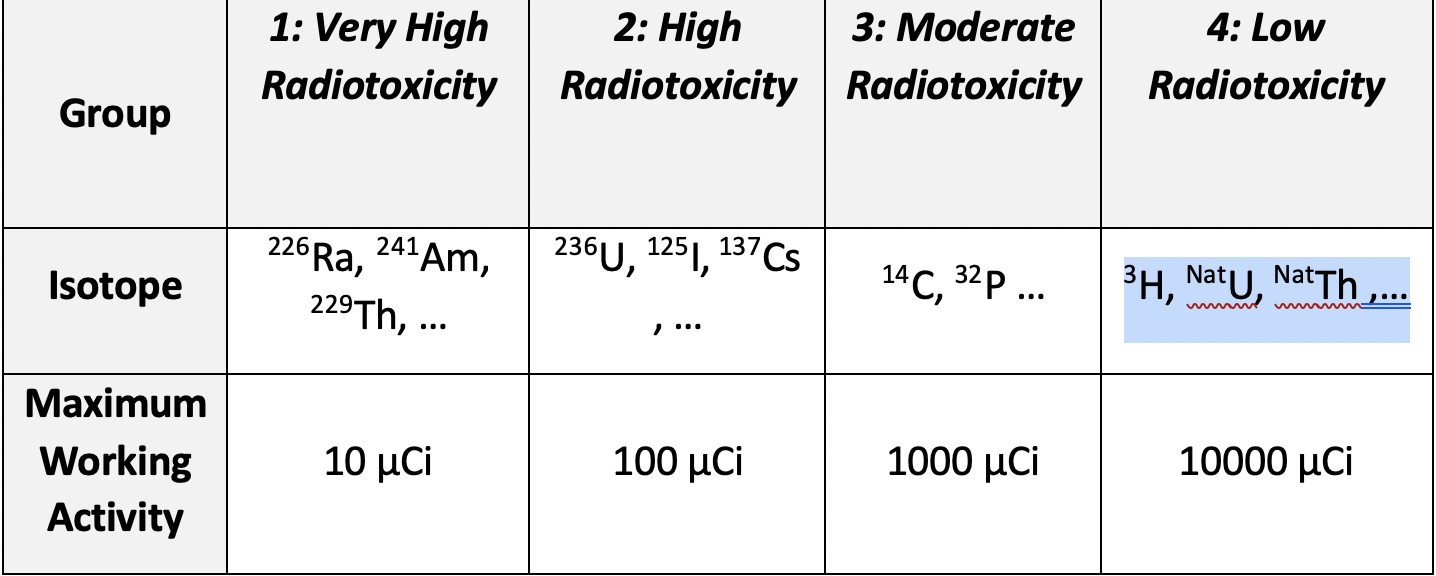Appendix A - Safe Usage and Managing Spills
General Safe Usage
- Wear a laboratory coat or other protective clothing at all times in areas where licensed materials are used.
- Wear disposable gloves at all times when handling licensed materials.
- After each procedure or before leaving the area, monitor hands, shoes, and clothing for contamination in a low-background area.
- Do not eat, drink, smoke, or apply cosmetics in any area where licensed material is stored or used.
- Do not store food, drink, or personal effects in areas where licensed material is stored or used.
- Wear personnel monitoring devices, if required, at all times while in areas where licensed materials are used or stored.
- Dispose of radioactive waste only in designated, labeled, and properly shielded receptacles.
- Never pipette by mouth.
- Store radioactive solutions in clearly labeled containers.
- Safely handle sealed sources.
- Secure all licensed material when it material when it is not under the constant surveillance and immediate control of the user(s).
- Shielding materials must be available for specific isotopes used in the lab. Use lead shielding for gamma emitters; Plexiglas for high energy beta emitters.
- All unstable and/or volatile radioactive materials must be used in chemical fume hoods.
- Follow any additional safety precautions provided by the radioisotope manufacturer or vendor. Maintain a copy of any package inserts.
- All countertops where radioactive materials are used must be clearly defined and labeled with the radiation symbol.
- All hoods in which radioactive materials are used must be clearly labeled with the radiation symbol.
- All sinks in which radioactive material is introduced by cleaning of contaminated lab ware must be clearly labeled with the radiation symbol.
- Any equipment in which radioactive material is used must be clearly labeled with the radiation symbol (Centrifuges, incubators, etc.).
Security of Radioactive Materials
- Licensed materials in use in controlled or unrestricted areas must be under constant surveillance
- Licensed materials will be secured by one or more of the following methods:
- storing and using licensed materials only in restricted areas
- limiting access to an entire facility or building or portion of the building to radiation workers
- providing storage areas that can be locked to prevent access to the licensed material
- implementing procedures that require a radiation worker to be within “line of sight” of the materials whenever licensed materials are in use
General Safety Procedure to Handle Spills
- Name and telephone number of RSO or an alternate person(s) is located on the laboratory entrance sign. Emergency equipment should be readily available for handling spills.
Spill Classification

- Minor spills are considered those that are non-volatile and less than or equal to 10% of the maximum working activity for the associated hazard group.
- Major spills are considered those that are either volatile or greater than 10% of the maximum working activity for the associated hazard group.
Minor Spills
- Instructions to Workers
- Notify persons in the area that a spill has occurred.
- Prevent the spread of contamination by covering the spill with absorbent paper. (Paper should be dampened if solids are spilled.)
- Clean up the spill, wearing disposable gloves and using absorbent paper.
- Carefully fold the absorbent paper with the clean side out and place in a plastic bag for transfer to a radioactive waste container. Put contaminated gloves and any other contaminated disposable material in the bag.
- Survey the area with an appropriate low-range radiation survey meter or other appropriate technique. Check the area around the spill for contamination. Also check hands, clothing, and shoes for contamination.
- Record the incident and corrective actions taken on the inventory, usage and waste spreadsheet.
- Notify the RSO of the incident.
- Reminders to RSO
- Follow up on the decontamination activities.
- As appropriate, determine cause and corrective actions needed; consider bioassays if licensed material may have been ingested, inhaled, or absorbed through the skin.
- If necessary, notify the NRC.
Major Spills
- Instructions to Workers
- Clear the area. If appropriate, survey all persons not involved in the spill and vacate the room.
- Prevent the spread of contamination by covering the spill with absorbent paper (paper should be dampened, if solids are spilled), but do not attempt to clean it up. To prevent the spread of contamination, limit the movement of all personnel who may be contaminated.
- If appropriate, shield the source only if it can be done without further contamination or significant increase in radiation exposure.
- Close the room and lock or otherwise secure the area to prevent entry. Post the room with a sign to warn anyone trying to enter that a spill of radioactive material has occurred.
- Notify the RSO immediately.
- Survey all personnel who could possibly have been contaminated.
- Decontaminate personnel by removing contaminated clothing and flushing contaminated
skin with lukewarm water and then washing with a mild soap.
- Allow no one to return to work in the area unless approved by the RSO.
- Cooperate with the RSO and/or the RSO’s staff (e.g., investigation of root cause, provision of requested bioassay samples).
- Follow the instructions of the RSO and/or the RSO’s staff (e.g., decontamination techniques, surveys, provision of bioassay samples, requested documentation).
- Reminders to RSO
- Confirm decontamination of personnel. If decontamination of personnel was not fully successful, consider inducing perspiration by covering the area with plastic.
- Then wash the affected area again to remove any contamination that was released by
perspiration.
- Supervise decontamination activities and document the results. Documentation should include location of surveys and decontamination results.
- Determine cause and needed corrective actions; consider need for bioassays if licensed material is suspected to have been ingested, inhaled, or absorbed through or injected under the skin.
- If necessary, notify the NRC.
